10 Reasons Your Cell Signal Is So Bad
Why is My Signal So Bad?
Ever found yourself in the middle of a crucial call or an exciting video only to be hit with a frustrating connection drop? You're certainly not alone.
Countless Canadians experience dropped calls and slow download speeds regularly. But what exactly disrupts cell signal and leaves you disconnected? We're here to shed light on the top reasons behind those annoying cellular signal disruptions.
We fix poor cell phone signal! Find the right signal booster for you:




What Causes Bad Cell Phone Signal?
If your cell service goes from decent to unstable, there is always a reason. Let’s go through the most common.
1) Building Materials

Building materials in your house, vehicle, workplace, or run-of-the-mill shopping mall are the main culprits for weaker cell reception in Canada. Cellular signals have a hard time penetrating metal, tinted low-E glass, concrete, and many other materials.
Notably, the impact is more pronounced on 5G compared to 4G. The higher frequencies used by 5G make it more susceptible to disturbance.
If you routinely notice service fading in and out while indoors, it’s likely your signal is being blocked by construction materials. Here is a list of building materials that block cell phone signals and by how much.
| Building Material | dB Loss |
| Foliage | -3 to -20 |
| Drywall | -2 |
| Fiberglass Insulation | -2 |
| Clear Glass | -4 |
| Plywood | -4 to -6 |
| Solid wood | -5 to -12 |
| Plaster | -8 to -16 |
| Brick & Stone | -8 to -28 |
| Concrete & Cement (6 inches) | -10 to -20 |
| Tinted & Low-E Glass | -24 to -40 |
TIP: Try moving near an open window or step outside. A cell phone booster can also help by bypassing signal-blocking materials and delivering a stronger cell signal wherever you need it. You will not have to constantly move around to make a call or send a text.
2) Cell Tower Distance
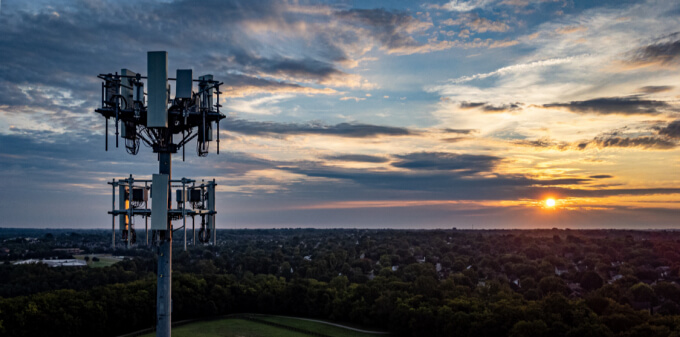
Depending on specifications, cell towers have a range of up to 45 miles. However, cellular signals can’t always travel that far due to obstacles and frequency limitations.
Lower frequencies, like those used by 4G and low-band 5G, have a longer wavelength, allowing them to travel farther and better penetrate obstacles. In contrast, higher frequencies used by C-Band and mmWave 5G have shorter wavelengths that offer increased capacity but struggle to travel long distances and are easily blocked by objects.
Thus, the further you are from a cell tower, and the more obstacles in the way, the weaker the signal gets. This leads to a "fish tank" voice, constant say-and-repeat moments, and the dreaded one-bar service. People living or traveling in rural areas tend to be the main victims.
TIP: Find your closest cell tower and relocate to the area of your house closest to it. Since this is not always convenient, consider a cell phone booster. It can strengthen your connection with distant cell towers for more dependable cell service. Alternatively, switching to a carrier with better coverage in your area can also improve your signal strength.
3) Heavy Cellular Traffic

Cell phones communicate with cell sites to send and receive calls, texts, and data. Cell towers and small cells can only handle so many devices at a time.
In heavily populated areas, all devices are fighting for a spot on the nearest cell tower. As more people connect, the signal becomes weaker for everybody, resulting in dropped calls and buffering videos. This can happen while stuck in traffic or at home during peak hours.
Due to limited capacity, cellular providers have network management policies in place. They throttle your connection during times of congestion after exceeding a certain number of GBs specified on your plan. This is because carriers prioritize users with higher-tier plans and stronger connections to the tower.
TIP: To mitigate or end unreliable cell signals due to heavy cellular traffic, consider upgrading your wireless plan. You can also use a cell signal booster to fine-tune the signal transmitted between your cell tower and device. This will allow you to keep your connection strong even during times of congestion.
4) Dead Spots
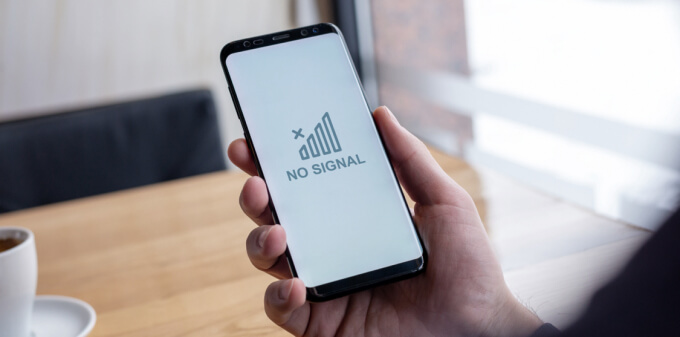
There are many pockets around Canada that aren’t covered by specific service providers. If you suddenly lose cell service, your home or vehicle may be in a dead zone.
Dead zones are areas without cell signal. They occur whenever there is any kind of obstruction between the user and the cell phone tower or a lack of towers in general.
You can use your carrier's coverage map to find out if you’re in a dead spot.
| Rogers Coverage Map | Telus Coverage Map | Bell Mobility Coverage Map |
Though, coverage maps are purely estimates; they are not 100% accurate. DeadCellZones.com is also a great resource. All data is crowdsourced.
TIP: The best way to get service in an area without signal is using WiFi calling. Broadband internet is required. Occasionally, though, a faint signal is present but too weak for your phone to register. In those cases, a signal booster can help.
5) Landscape

Geographic features often cause cell signals to go bad. Trees, for example, are notorious for blocking cell phone signals. Whether you’re RV or your house is surrounded by large foliage, the leaf canopy can cause a massive drop in cellular reception.
Mountains, hills, and valleys, too. Just like building materials, cellular signals have a hard time penetrating natural barriers. If you live on one side of a mountain, and the only cell tower in your area is on the other, you’re not likely to get good reception.
TIP: Unless you’re able to cut down the trees or change location, a signal booster is your best bet against natural barriers.
6) Weather
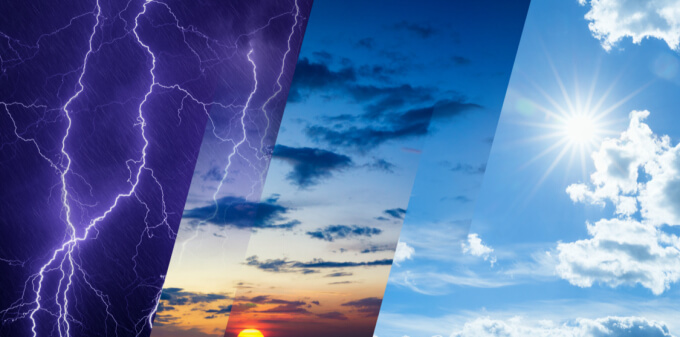
Shockingly, weather can affect cell service. Cell phones transmit and receive electromagnetic waves. Weather phenomena, such as humidity, thunder, lightning, wind, rain, snow, and ice, disrupt the waves, degrading performance. It’s an important reminder that the impact varies not only depending on the specific weather event but also on the existing signal strength in your area.
TIP: Unfortunately, there’s not much you can do about the weather, it’s out of anybody’s control. However, a signal booster can help fine-tune the signal received from your nearest cell tower. Even during bad weather, you'll be able to enjoy reliable talk, text, and data.
7) Blocking Your Antenna
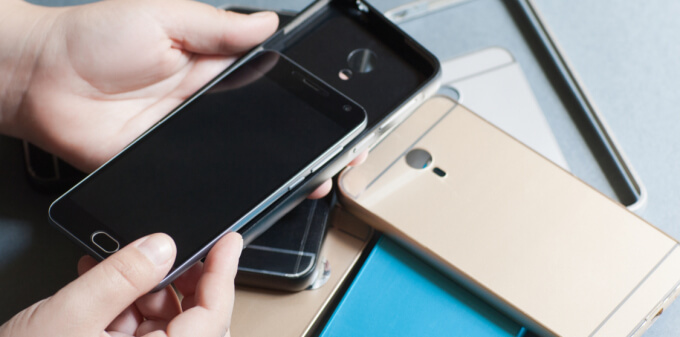
All mobile phones use antennas to transmit cellular signals. Back in the day, phones had extractable exterior antennas. While inconvenient, their external design offered a big perk: consistent signal strength. This is because the antennas were practically impossible to block.
Today’s phones have antennas embedded inside. The downside? Anything in the way, whether it’s your hand, a magnetic plate, or a metal case, can hurt reception. The antenna’s location will depend on the phone’s model.
A decrease in signal strength due to blocking the antenna may not be noticeable in areas with strong reception. However, it can make a huge difference in near-dead zone environments.
TIP: Find the location of your antenna and avoid blocking it with your hand or a magnetic phone mount plate. Try not to use thick or metal cases that can hinder the amount of signal the antenna receives.
8) Outdated Device Model
Carriers are constantly upgrading their networks with new frequencies to handle increasing data demands. Unfortunately, older iPhone and Android models might not be compatible with these newer frequencies. This incompatibility can lead to dropped calls, slow data speeds, and unreliable connections overall.
TIP: Upgrade your device.
9) Low Battery
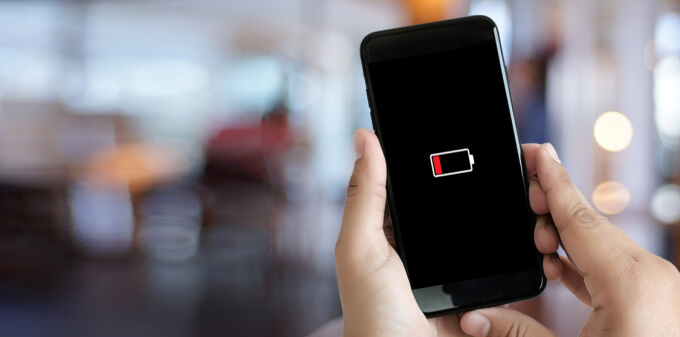
Cellular phones need energy to maintain a connection with a cell tower. They may struggle sending and receiving a strong signal when the battery is low.
TIP: Don’t put off charging your phone. You may find yourself with a weak signal when you need it most. If you don’t have access to a power source, try to have a charged power bank on hand at all times just in case.
10) Cosmic Events: Solar Flares
Eruptions on the surface of the sun send plumes of gas into the atmosphere and have been known to disrupt mobile phone communications. These so-called solar flares produce shock waves that travel through space. This can mess with satellites and Earth's magnetic field, causing temporary issues with your cell reception.
TIP: Unfortunately, there is not much that can be done about cosmic events.
FAQs
Can a Cell Phone Case Affect Signal?
Yes. Some phone cases can prevent signal from reaching your phone’s internal antenna. Thin leather, plastic, or rubber cases won’t significantly affect your cell signal. HOWEVER, metal cases, thick battery cases, and the like pose a greater threat to your connection.
Do Magnets Affect Signal?
Electromagnetic fields can cause signal interference. Though, unless you're walking around with a magnet in your pocket, you're not likely to experience much of that.
Does Weak Signal Drain My Battery?
Definitely. Your phone has to work significantly harder to communicate to and from your cell tower with a weaker signal. This results in significantly shorter battery life.
Can an Old Phone Cause Bad Service?
Yes. As cellular technology evolves, so do phones.
Older phones don’t have the technology needed to tap into the best and fastest networks available. While your friends are enjoying crisp calls or ultra-fast data, you may be stuck on an unreliable network. As time goes on, older phones also lose software update capabilities, which help with performance.
Does Smoke Affect Cell Phone Signal?
It can. Smoke can reflect and absorb cellular signals, degrading performance. Higher frequencies are affected more than lower frequencies. By how much depends on the density of the smoke.
How to Fix Bad Phone Signal?
There are a few ways to fix bad phone signal, but cell phone signal boosters (also known as cellular repeaters or amplifiers) offer the most comprehensive and reliable solution. While other methods might provide temporary fixes, these boosters provide a more direct and powerful approach to boosting your signal anywhere you need it.
A cellular booster pulls in existing 5G/4G/LTE signals, amplifies them, and rebroadcasts the boosted signal where you need it. This is done using:
- Cellular Antennas – Outdoor antenna pulls in weak signal and indoor antenna broadcasts boosted signal.
- An Amplifier – Boosts cell signals up to usable levels.
- Coaxial Cables – Connects everything together and helps bypass building material.
The results? Improved cell phone service. Faster internet. Better talk and text. They are compatible with all cellular devices and carriers and require no WiFi, making them a convenient one-time purchase to improve your signal. For more information, visit our guide on how signal boosters work.
Below are our top signal repeater models for increasing your phone’s signal and service at home, office, or vehicle.

Most popular. For small to mid-size homes. Up to 465 sq m coverage.
Buy Now: $799.99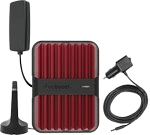
Most powerful and popular. Fits any type of vehicle. For rural and urban driving.
Buy Now: $699.99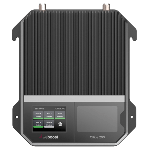
Best-selling. For small businesses. Covers up to 930 sq m.
Buy Now: $2,199.99Wilson Amplifiers Can Help You Fix Bad Cell Phone Reception
Wilson Amplifiers is a leading provider of cellular amplifiers for homes, offices, and vehicles. All of our units boost 5G, 4G, and LTE for any phone with any carrier.
We seriously hate dropped calls and poor coverage. It's our goal to stomp out spotty signal and ensure you stay connected whenever you need it. Whatever is causing your signal to go bad, a signal booster can help relatively everywhere.
So stop letting weak signal hold you back. Contact us today to find the perfect booster and say goodbye to all your bad cell reception troubles!
Call us (1-800-373-2927), email (sales@wilsonamplifiers.ca), or chat with us, for a free consultation. Ask us anything, we’re happy to help!


Money Back Guarantee

Technical Support